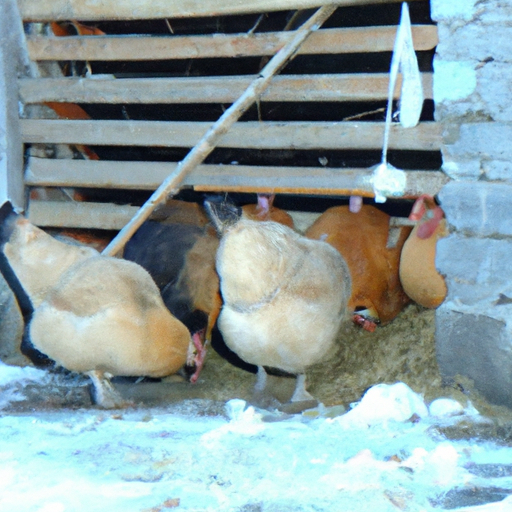In today’s bustling urban landscapes, the increase in popularity of urban farming and backyard poultry has led to larger flocks of chickens being raised in close proximity. While this trend brings numerous benefits, such as fostering sustainable food production and connecting people with nature, it also poses unique management challenges. With larger flocks comes the need for enhanced organization, increased biosecurity measures, and ensuring the well-being of the birds in a confined space. This article aims to explore the management challenges faced by those overseeing larger flocks of chickens in urban settings and propose effective strategies to overcome them. Urban settings present a unique set of management challenges for individuals or organizations with larger flocks of birds. Whether you are raising chickens, ducks, or other poultry, it is essential to ensure the health and well-being of your flock, as well as address concerns such as waste management, noise disturbance, and legal considerations. In this comprehensive article, we will explore various aspects of health and disease management, space and infrastructure, feed and nutrition, waste and odor control, sustainability and resource management, communication and education, predator and pest control, zoning and legal considerations, neighbor complaints and noise, as well as emergency preparedness and disaster management.
Health and Disease Management
Monitoring flock health is crucial when managing larger flocks in urban settings. Regular check-ups and observations can help identify any signs of illness or disease early on, allowing for prompt treatment. It is essential to establish a relationship with a veterinarian who specializes in avian health and can provide guidance on disease prevention and treatment. Additionally, proper biosecurity measures should be implemented to minimize the risk of introducing diseases into your flock, such as limiting visitor access, disinfecting equipment, and isolating sick birds.
Preventing and Treating Diseases
Prevention is key when it comes to managing diseases in larger flocks. Vaccinations should be considered to protect against common diseases prevalent in the area. Regular cleaning and disinfection of housing and equipment can help control the spread of pathogens. If any birds do become ill, it is crucial to provide appropriate treatment promptly. Working closely with a veterinarian is important to diagnose the disease accurately and develop a tailored treatment plan to ensure the best outcomes for your flock.
Managing Parasites
Parasite control is another important aspect of flock management. Parasites such as mites, lice, and worms can cause significant health issues if left unchecked. Regular checks for external parasites, as well as routine deworming, should be a part of your management strategy. Providing clean bedding, maintaining good sanitation practices, and utilizing appropriate parasite control products can help keep your flock healthy and comfortable.
Providing Adequate Space
In urban settings, space can be limited. However, it is crucial to ensure your flock has enough room to move, exercise, and exhibit natural behaviors. Each bird should have sufficient space to roam freely, access to appropriate perches, and areas for dust bathing. Overcrowding can lead to stress, aggression, and the spread of diseases. Therefore, it is vital to consider the size of your flock and allocate space accordingly.
Designing Suitable Housing
Designing suitable housing goes hand in hand with providing adequate space. The housing should provide protection from the elements, predators, and disease vectors. It should be secure, well-ventilated, easy to clean, and equipped with nest boxes, roosting bars, and suitable flooring materials. Proper housing design allows for easy management and maintenance, ensuring the health and well-being of your flock.
Securing Fencing and Enclosures
In urban settings, it is essential to secure your flock with appropriate fencing and enclosures to prevent escape and protect them from predators. Fencing should be sturdy and tall enough to deter predators such as raccoons, foxes, and stray dogs. Consider reinforcing the bottom of the fence to prevent animals from digging under it. Additionally, small-mesh wire can be used to cover the enclosure to prevent birds from flying out or predators from entering.
Meeting Nutritional Needs
Proper nutrition is vital for the overall health and productivity of your flock. Ensure that your birds have access to a balanced diet that meets their nutritional requirements. This includes providing a variety of feed sources, such as grains, proteins, and minerals. Additionally, consider offering grit and oyster shell to aid in digestion and eggshell production, respectively. Regularly monitor feed consumption and adjust the diet as needed to ensure optimal health and performance.
Managing Feed Storage
Proper feed storage is crucial to prevent spoilage, contamination, and infestations. Store feed in clean, dry, and rodent-proof containers to maintain its quality and integrity. It is essential to rotate feed regularly to ensure freshness and prevent the growth of mold or toxins. Additionally, consider investing in bulk feed storage options to reduce costs and minimize the need for frequent trips to purchase feed.
Dealing with Food Waste
Food waste management is a significant consideration when managing larger flocks. Ensure that any excess or spoiled food is disposed of properly to avoid attracting pests and causing hygiene issues. Composting can be a sustainable option for utilizing food scraps, as well as providing nutrient-rich amendments for your garden. Consider implementing a composting system and educating yourself about the proper composting techniques to minimize waste and promote environmental sustainability.
Handling Manure and Waste Removal
Urban settings demand careful management of waste, including manure. Regularly cleaning the coop and removing manure is essential for maintaining cleanliness and preventing the buildup of harmful bacteria and odors. Consider composting the manure to produce organic fertilizer or explore waste management options that comply with local regulations. Proper handling and disposal of waste contribute to the health and well-being of your flock, as well as the surrounding environment.
Minimizing Odor and Pollution
When managing larger flocks in urban settings, it is crucial to minimize odor and pollution to maintain positive relationships with neighbors and comply with environmental regulations. Proper waste management, such as regular cleaning and appropriate disposal techniques, can help reduce odors. Additionally, consider the use of natural odor control products, proper ventilation in housing, and the implementation of technologies such as biofilters to further minimize odors and air pollution.
Complying with Environmental Regulations
Urban settings often have specific regulations regarding flock management to protect public health and the environment. It is essential to familiarize yourself with the local and national laws and regulations that apply to your situation. Ensure that you obtain any necessary permits or licenses required for raising poultry. By complying with these regulations, you contribute to the overall well-being of your flock, your community, and the environment.
Reducing Resource Consumption
Sustainability is a growing concern, and managing larger flocks in urban settings provides an opportunity to implement resource-efficient practices. Opt for energy-efficient lighting systems, use recycled materials for coop construction, and reduce water consumption by implementing proper watering systems, such as nipples or automatic drinkers. By reducing resource consumption, you contribute to a more sustainable future while minimizing your flock’s ecological footprint.
Implementing Sustainable Practices
Beyond resource consumption, implementing sustainable practices can extend to feed sourcing, waste management, and pest control. Consider sourcing locally produced feed to support regional agriculture and reduce transportation emissions. Explore sustainable pest control methods, such as using natural predators or implementing integrated pest management strategies. By adopting these sustainable practices, you contribute to the well-being of your flock and the surrounding ecosystem.
Utilizing Alternative Energy Sources
In urban settings, there are often various alternative energy sources available that can contribute to the sustainability of your flock management. Solar panels can power lighting systems or electric fences, while wind turbines can generate electricity for certain applications. Evaluate the feasibility and cost-effectiveness of these alternative energy options to reduce your reliance on conventional energy sources and minimize environmental impact.
Educating the Local Community
Involving and educating the local community about your flock management practices is an essential part of maintaining good neighbor relations. Host workshops or informational events to share the benefits and best practices of raising poultry. Demonstrate responsible flock management to help alleviate concerns and misconceptions about noise, odor, and other potential issues. By engaging with the community, you foster a sense of understanding and create opportunities for collaboration and support.
Maintaining Good Neighbor Relations
Being a responsible neighbor goes beyond educating the community. Strive to be a good neighbor by addressing concerns promptly, communicating openly, and taking necessary steps to mitigate any negative impacts your flock may have on the neighborhood. By maintaining positive relationships with your neighbors, you foster a sense of community and contribute to a harmonious urban environment.
Promoting Responsible Flock Management
Publicly promoting responsible flock management is a valuable way to contribute to the well-being of urban communities. Share your experiences, knowledge, and best practices through social media, local publications, or community websites. By raising awareness about responsible flock management practices, you empower others to make informed decisions and contribute to a sustainable and harmonious urban environment.
Preventing Predator Attacks
Predators pose a significant threat to urban flocks. Implementing appropriate predator control measures is essential to ensure the safety of your flock. Secure your coop and runs with sturdy fencing and hardware cloth. Consider installing motion-activated lights or sound devices to deter predators. Additionally, employing guardian animals, such as dogs or llamas, can help protect your flock from potential threats.
Managing Pest Infestations
Pest infestations can compromise the health and well-being of your flock. Implementing integrated pest management practices can help control pests without harming your birds or the environment. Regularly inspect your flock and housing for signs of infestation and take immediate action to address the issue. Utilize natural pest control methods, such as diatomaceous earth or predator insects, to minimize the use of chemical pesticides.
Ensuring Flock Safety
Ensuring the safety of your flock is crucial during both day-to-day activities and emergency situations. Regularly inspect your coop and fencing for any potential hazards or weaknesses. Have a comprehensive flock management plan in place that includes measures for flock protection during severe weather, natural disasters, or other emergencies. Collaborate with local authorities and emergency management agencies to ensure coordination and timely response in case of emergencies.
Understanding Zoning Regulations
Understanding and complying with zoning regulations is essential when raising larger flocks in urban settings. Zoning laws often dictate the maximum number of birds allowed, setback requirements, and other specific regulations. Research and consult the local zoning ordinances to ensure that your flock management practices align with the designated land-use requirements. This will help you avoid potential legal issues and maintain a harmonious relationship with local authorities.
Obtaining Necessary Permits and Licenses
In addition to zoning regulations, there may be specific permits or licenses required to legally raise poultry in urban settings. Contact the local government or regulatory agencies responsible for animal husbandry to determine the necessary documentation. Properly obtaining and maintaining these permits and licenses ensures that you are operating within the law and upholding the health and safety standards for your flock and community.
Addressing Neighbor Complaints
Neighbor complaints can arise in any urban setting, and it is essential to address them promptly and respectfully. Listen to their concerns, offer solutions where possible, and assure them that you are taking steps to mitigate any issues. Consider implementing soundproofing measures or adjusting the flock management practices that may be causing the disturbance. By addressing neighbor complaints, you foster positive relationships and avoid potential conflicts.
Mitigating Noise Disturbances
Noise disturbances can be a common concern in urban settings, especially if your flock includes roosters or if they are in close proximity to neighbor’s homes. Utilize soundproofing materials, such as acoustic panels or insulation, to minimize noise transmission. Relocate the coop or adjust the flock management practices to reduce noise levels during sensitive hours. Being proactive in noise mitigation demonstrates your commitment to being a responsible urban flock owner.
Implementing Soundproofing Measures
If noise disturbances are a recurring issue, consider implementing additional soundproofing measures within your coop or surrounding structures. Acoustic treatments such as rubber mats, soundproof curtains, or insulation can help absorb and reduce noise levels. Consult with professionals or explore DIY options to find the most suitable soundproofing solutions for your unique situation. By implementing soundproofing measures, you minimize the impact of noise disturbances on your neighbors.
Developing Emergency Plans
Emergency preparedness is crucial when managing larger flocks in urban settings. Develop comprehensive plans to address various emergency scenarios, such as fires, severe weather, or disease outbreaks. Identify evacuation routes, establish emergency contacts, and ensure that all necessary supplies, including food and water, are readily available. Regularly review and update these plans to account for any changes in your flock or the surrounding environment.
Ensuring Flock Safety During Disasters
During emergencies or disasters, ensuring the safety of your flock is of utmost importance. Have a designated safe area within your property where your birds can be temporarily relocated or housed if necessary. This area should be secure, protected from the elements, and stocked with essential supplies. Regularly communicate and coordinate with local authorities or emergency management agencies to stay informed and ensure a comprehensive response plan in the event of a disaster.
Coordinating with Local Authorities
Maintaining open lines of communication with local authorities is vital when managing larger flocks in urban settings. Familiarize yourself with the emergency management plans and protocols specific to your area. Identify the relevant authorities and establish contacts to coordinate response efforts during emergencies. By proactively coordinating with local authorities, you contribute to a well-coordinated and efficient emergency response while protecting the safety of your flock.
In conclusion, managing larger flocks in urban settings presents a unique set of challenges that require careful attention and thorough planning. From health and disease management to waste and odor control, sustainability, communication, and emergency preparedness, there are multiple aspects to consider when ensuring the well-being of your flock and maintaining harmonious relationships with neighbors and authorities. By implementing responsible management practices, addressing concerns promptly, and complying with local regulations, you can create a thriving and sustainable urban environment for your flock and the surrounding community.




